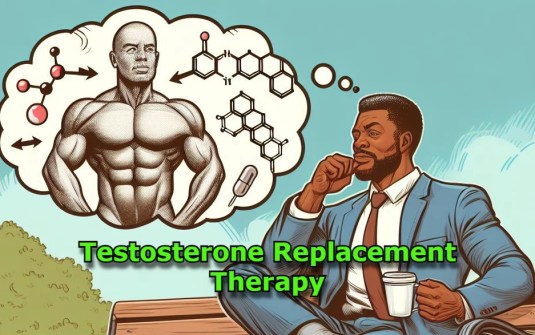Testosterone Replacement Therapy: Testosterone is a crucial hormone that significantly affects a man’s overall health and well-being, which is why visiting a men’s health clinic can help address any concerns and provide expert guidance. It influences everything from issues like muscle mass and bone density to emotions and energy levels. However, as men age, the levels of this hormone naturally decline, often leading to inciting symptoms that can impact their quality of life.
In such cases, testosterone replacement therapy (TRT) can be considered as a potential solution. So, explore the key facets to consider when evaluating whether TRT is the right choice for you.

Understanding the Symptoms Of Testosterone Replacement
The first step in determining whether TRT suits you is to recognize the symptoms of low testosterone. Common signs include fatigue, reduced sex drive, erectile dysfunction, mood swings, and decreased muscle mass. These symptoms can disrupt daily life and may be mistaken for other health issues. Therefore, it’s essential to consult with a healthcare professional to confirm if these symptoms are indeed related to low testosterone or if they may be caused by other underlying health issues.
Evaluating Your Testosterone Levels
A blood test is quite a reliable method for measuring your testosterone levels accurately. During this test, your healthcare provider will draw your blood and send it to the lab for analysis. They will then compare the results to the reference range for your age group. If your levels drop below the normal range and you are experiencing symptoms, TRT may be a viable option to consider. It’s crucial to have this confirmation before proceeding with any treatment.
Assessing the Potential Benefits
Once you have confirmed the levels and identified related symptoms, it’s essential to understand the potential benefits of a low testosterone treatment. This therapy can help improve energy levels, enhance mood, increase muscle mass, and boost sexual function. Many men find relief from the discomfort and challenges associated with low testosterone through TRT.
However, it’s crucial to have realistic expectations and recognize that not everyone will have the same results. Your healthcare provider can guide what you can reasonably expect.
The Importance of Lifestyle Changes
Before jumping into TRT, it’s crucial to explore lifestyle changes that may help address this issue naturally. Simple modifications such as regular exercise, a healthy diet rich in nutrients, stress management, and adequate sleep can have quite a positive impact on testosterone levels. Maintaining a proper lifestyle can improve your overall well-being and alleviate some of the symptoms associated with low testosterone. In some cases, adding a supplement like an estrogen blocker amazon can support hormonal balance. Your doctor can guide you in making these choices.
Consultation with a Healthcare Provider
The decision to undergo testosterone replacement therapy (TRT) should be made in close consultation with a qualified healthcare provider. They will comprehensively assess your medical history, symptoms, age, and lifestyle factors to meticulously determine if TRT aligns with your health needs. A healthcare professional is equipped to thoroughly discuss the diverse TRT options available, such as injections, gels, patches, and implants, ensuring that you are well-informed.
Importantly, they can guide you in selecting the most suitable method tailored to your unique circumstances and health objectives while closely monitoring your progress and adjusting the treatment as necessary to optimize outcomes.
Also Check: The magic of micro-interactions
FAQs
1. Are there alternatives to TRT for increasing testosterone levels?
Yes, lifestyle changes can sometimes help boost testosterone naturally. Exercise, a healthy diet, stress management, and enough sleep can all have a positive impact. Talk to your doctor about personalized recommendations for optimizing your lifestyle.
2. What are the potential risks and side effects of TRT?
Like any medication, TRT can have side effects. Common ones include increased red blood cell count, acne, breast tenderness, and mood swings. More serious risks, although rare, are possible. Discuss all potential risks and benefits thoroughly with your doctor.
Final Words:
In conclusion, determining whether testosterone replacement therapy is the best choice for you requires careful consideration of several factors. Begin by recognizing the symptoms associated with low testosterone and consulting with a healthcare professional for a proper diagnosis. If your levels are confirmed to be low, and you are experiencing related symptoms, you can explore the potential benefits of TRT.
However, always weigh the risks and side effects of this treatment and discuss any concerns with your healthcare provider. Additionally, remember to explore lifestyle changes and alternative options that may help improve your testosterone levels naturally.
Tags: testosterone replacement therapy cost, once you start testosterone therapy can you stop?, testosterone therapy for women, testosterone replacement therapy injections, testosterone replacement therapy near me, testosterone replacement therapy gel.
